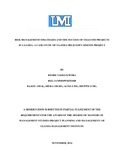Risk Management Strategies and the Success of Telecom Projects in Uganda: A Case Study of Uganda Telecom’s Msente Project

View/
Date
2014-11Author
BWIRE, Tadeo Kwoba
Namanya, Anaclet Mutiba (supervisor)
Beinebyabo, Adrian (supervisor)
Metadata
Show full item recordAbstract
This study focused on the contribution of risk management strategies to the success of Telecom projects using Uganda Telecom Msente project a case study. The study was undertaken to check if the strategies put in place such as risk avoidance, mitigation and transfer contribute to the success of the Msente project. The study was guided by the following research objectives which were:- to find out the contribution of risk avoidance strategy to the success of Uganda Telecom Msente Project, to examine how risk mitigation strategy affect the success of Uganda Telecom Msente project and to assess the effect of risk transfer strategy to the success of Uganda Telecom Msente project. The study design used was cross-sectional survey to collect data from staff and beneficiaries of the M-sente project. The study adopted both qualitative and quantitative approaches. The respondents for this study came from Uganda Telecom staff and beneficiaries of the M-sente project the researcher designed questionnaires and interview guide that were used to in data collection. The response rate of the UTL M-sente staff distributed questionnaires was ninety eight percent (98%) while the response rate of the M-sente beneficiaries distributed questionnaires was ninety four percent (94%).The key findings were that there is a significant and positive relationship between risk avoidance and the success of Uganda Telecom Msente project. The results also indicated that there was a significant and positive relationship between risk mitigation and success of Uganda Telecom Msente project. There was a significant and positive relationship between risk transfer strategy and success of Uganda Telecom Msente project. It was established that risk management has an effect on the success of M-sente project. The study recommends that management of Uganda Telecom should focus on the environment in which it is operating by identifying all potential risks in the process and developing systematic risk avoidance criteria; management should decide on the relationship between the likelihood (probability of frequency) and the severity of occurrence (Impacts) of the identified risks respectively and management of Uganda Telecom should carry out a systematic risk transfer strategy
